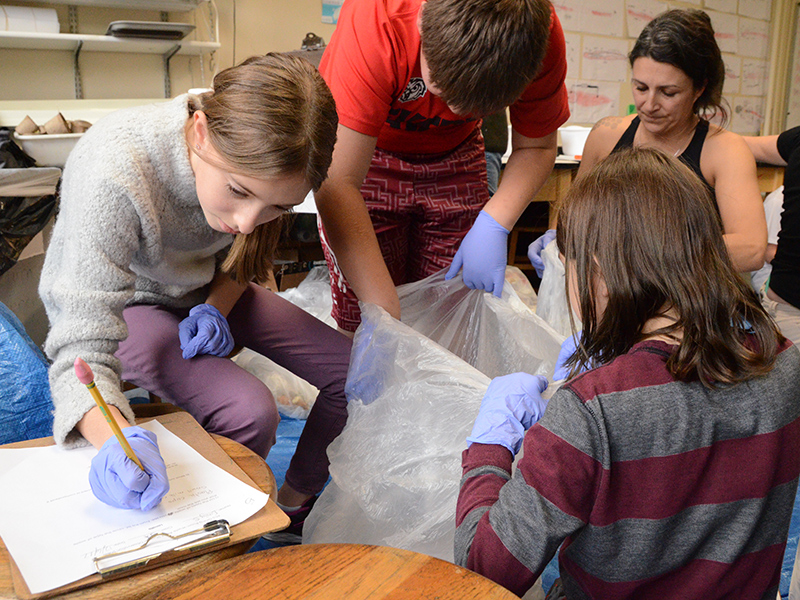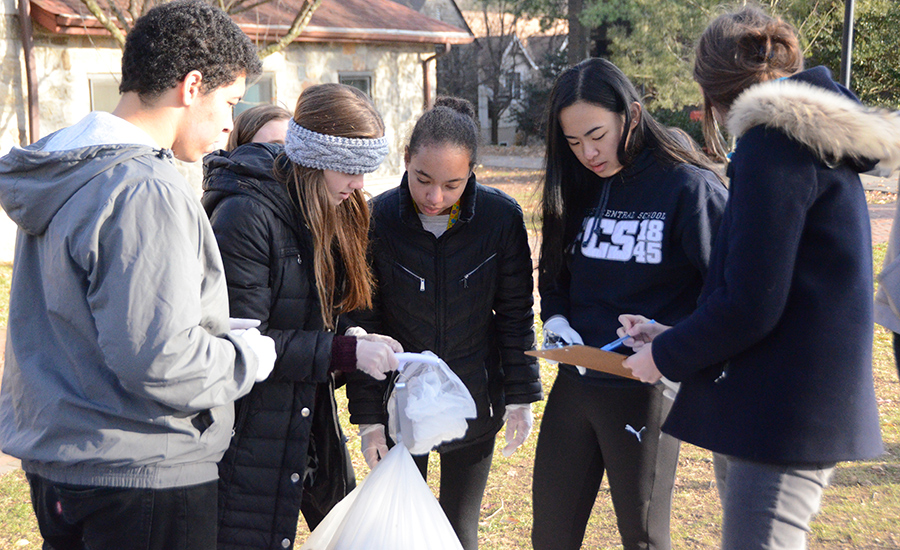Middle and Upper School students and faculty gathered with Mary Ann Boyer and Sam York of BSEC on a cold December day to conduct an initial cafeteria waste audit.
In every division, Friends’ Central students are taking a leadership role when it comes to waste generated on their campuses. This is just one of the many steps the School has taken to reduce environmental waste and improve sustainability efforts in the last few months.
In the Lower School, fifth grade students collected bags of waste from one lunch period and carted them to Lower School science teacher Tiffany Borsch’s science class. The students got knee deep in waste in the beginning of December. Students wearing purple rubber gloves sorted through landfill and food waste, placing it in three different categories: liquid, landfill, and composting, determining what can be recycled, what can be used for compost, and what is bound for landfill. Students recorded their observations and weighed the waste, comparing the results grade by grade.
The fifth graders determined how much was generated in one day with 230 students on the Lower School campus. The result? Over thirty nine pounds of waste was recorded from the Lower School dining hall. “This includes food waste, landfill, liquid waste, and recyclables,” said Tiffany, who conducted the waste audit with Sustainability Consultants Mary Ann Boyer and intern Sam York of Boyer Sudduth Environmental Consultants.
Large blue tarps covered the science room floor with bags piled in one corner. As the fifth graders arrived to science class, Mary Ann quizzed students about the 5 R’s. “Most students know the 3 R’s: Reduce, Reuse, and Recycle,” she noted. “I like to challenge them with two other R’s: Refuse and Re-Earth. When you can, it’s good to “refuse” unnecessary items coming into the waste stream in the first place.” She added, “Re-earth refers to items that can “rot” and return back to Earth or composting.” She added, “By keeping waste from entering at the source in the first place, you can greatly reduce your waste.”
Lower School students were surprised by the results of the audit, and together, they suggested ways to reduce the amount of waste. Fifth grader Anna K suggested, “Take only what you can eat” and if you want more, go back for seconds. Her classmate Milo stated, “My parents pack my lunch in reusable containers.” Another student suggested buy in bulk rather than individual packages. Borsch believes this teaching is essential at Friends’ Central, particularly beginning when students are at a young age. She commented, “Teaching about sustainability is integral to who we are as a community. As change makers, these students will be tasked with solving the environmental problems previous generations created - resource depletion and degradation, population growth and food scarcity, habitat loss and decreased biodiversity. It is our moral imperative to teach our students to recognize and scientifically understand these problems while also empowering them to create solutions.”
The following day, Middle and Upper School students conducted their own dining hall waste audit on the City Avenue campus. There was a winter chill in the air as students sorted through bags on the Felsen Common. Blue tarps labeled “food waste,” “landfill,” and “recyclables” were littered with bags from the dining hall. Middle and Upper School students counted 35 bags from one day (22 landfill bags and 13 bags of recyclables). The results from the waste audit showed that from the bags that were sorted: 63% of the waste was landfill, 14% recyclables, and 23% food waste. Upper School science teacher Phyllis Hansen shared, “Having an initial baseline of trash/recycling quantities, an educational campaign will follow that allows the Middle and Upper School students opportunities to evaluate their personal trash footprint and discover ways to conserve. The waste audit will be repeated in the spring and students will quantify effectiveness of the campaign.”
“The waste audits are part of FCS’s broader school-wide initiative to reduce its environmental footprint and address ways to be more environmentally sustainable,” stated Miriam Fisher Schaefer, Friends’ Central’s Director for Finance and Operations. “We’ve already made strides this year to reduce our energy consumption by 38% through retrofitting with LED lights and improving building automations systems. Now that we have a baseline of data, we can make changes both behaviorally and operationally in how we can reduce our waste. This is just the beginning for Friends’ Central in ways we can reduce our environmental impact while helping our planet.”
Article originally appeared on the Friends' Central School website on December 18, 2017.





